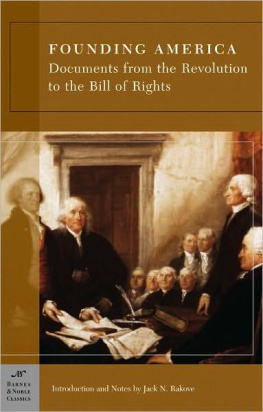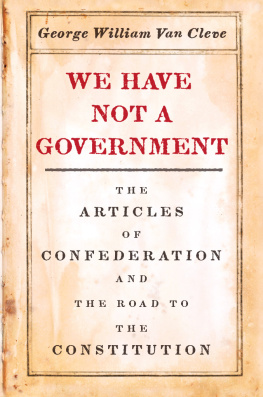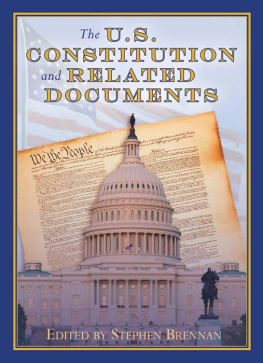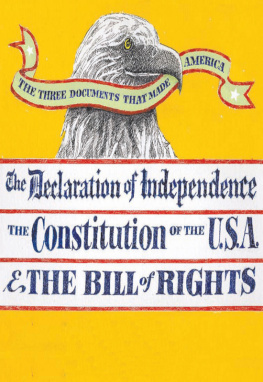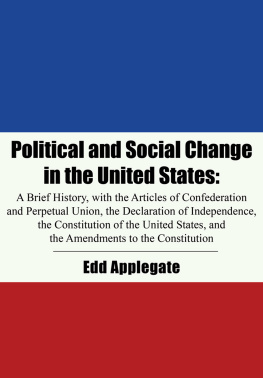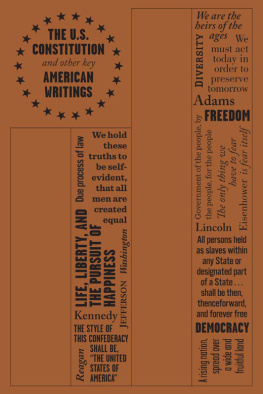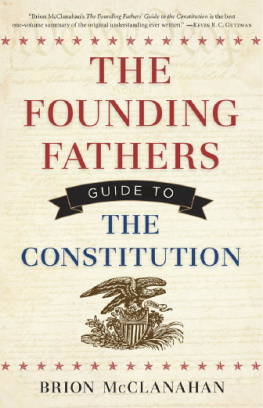Table of Contents
From the Pages of Founding America
However peaceably your Colonies have submitted to your Government,
shewn their Affection to your Interest, and patiently borne
their Grievances, you are to suppose them always inclined to revolt,
and treat them accordingly.
(from Benjamin Franklin: Rules by Which a Great Empire
May Be Reduced to a Small One, page 13)
I long to hear that you have declared an independancyand by the
way in the new Code of Laws which I suppose it will be necessary for
you to make I desire you would Remember the Ladies, and be more
generous and favourable to them than your ancestors. Do not put
such unlimited power into the hands of the Husbands. Remember
all Men would be tyrants if they could.
(from a letter from Abigail Adams to John Adams, March 31, 1776, page 68)
We hold these truths to be self evident: that all men are created
equal; that they are endowed by their creator with [certain] inherent
and inalienable rights; that among these are life, liberty & the
pursuit of happiness: that to secure these rights, governments are
instituted among men, deriving their just powers from the consent
of the governed.
(from a draft of the Declaration of Independence,
by Thomas Jefferson, page 124)
May the choicest of heavens favours, both here and hereafter, attend
those who, under the devine auspices, have secured innumerable
blessings for others; with these wishes, and this benediction, the Commander
in Chief is about to retire from Service. The Curtain of seperation
will soon be drawn, and the military scene to him will be closed
for ever.
(from George Washington, Farewell Address to the
Armies of the United States, page 259)
Nor should our assembly be deluded by the integrity of their own
purposes, and conclude that these unlimited powers will never be
abused, because themselves are not disposed to abuse them. They
should look forward to a time, and that not a distant one, when a
corruption in this, as in the country from which we derive our origin,
will have seized the heads of government.
(from Thomas Jefferson, Notes on the State of Virginia, page 267)
Whilst we assert for ourselves a freedom to embrace, to profess, and
observe the religion which we believe to be of divine origin, we cannot
deny an equal freedom to those, whose minds have not yet
yielded to the evidence which has convinced us.
(from James Madison, A Memorial and Remonstrance
against Religious Assessments, page 296)
I can consent to no government, which, in my opinion, is not calculated
equally to preserve the rights of all orders of men in the community.
(from Letters from the Federal Farmer, page 435)
But what is government itself, but the greatest of all reflections on
human nature? If men were angels, no government would be necessary.
If angels were to govern men, neither external nor internal controls
on government would be necessary. In framing a government
which is to be administered by men over men, the great difficulty
lies in this: you must first enable the government to control the governed
; and in the next place oblige it to control itself.
(from The Federalist No. 51, page 525)
I will candidly acknowledge, that, over and above all these considerations,
I do conceive that the Constitution may be amended; that is
to say, if all power is subject to abuse, that then it is possible the
abuse of the powers of the General Government may be guarded
against in a more secure manner than is now done.
(from James Madisons speech to the House of
Representatives, June 8, 1789, page 615)
The powers not delegated to the United States by the Constitution,
nor prohibited by it to the States, are reserved to the States respectively,
or to the people.
(from a draft of amendments to the Constitution, page 637)
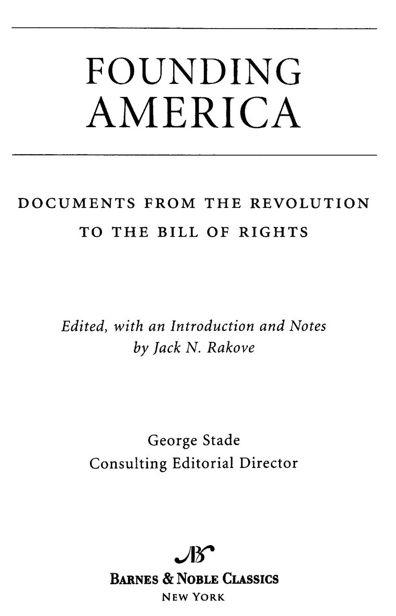
NEW YORK
Published by Barnes & Noble Books
122 Fifth Avenue
New York, NY 10011
www.barnesandnoble.com/classics
Published in 2006 by Barnes & Noble Classics with new Introductions, Timeline,
Notes, and For Further Reading.
General Introduction, Header Introductions, Notes,
and For Further Reading
Copyright 2006 by Jack N. Rakove.
Founding America: A Timeline
Copyright 2006 by Barnes & Noble, Inc.
All rights reserved. No part of this publication may be reproduced or transmitted in any form or by any means, electronic or mechanical, including photocopy, recording, or any information storage and retrieval system, without the prior written permission of the publisher.
Barnes & Noble Classics and the Barnes & Noble Classics colophon are trademarks of Barnes & Noble, Inc.
Founding America:
Documents from the Revolution to the Bill of Rights
ISBN-13: 978-1-59308-230-7
eISBN : 97-8-141-14322-0
ISBN-10: 1-59308-230-4
LC Control Number 2005935854
Produced and published in conjunction with:
Fine Creative Media, Inc.
322 Eighth Avenue
New York, NY 10001
Michael J. Fine, President and Publisher
Printed in the United States of America
QM
1 3 5 7 9 10 8 6 4 2
FIRST PRINTING
Founding America:
A Timeline
| 1765 | On March 22, the British Parliament adopts the Stamp Act, imposing on the American colonies a tax on legal documents, newspapers, and playing cards. Colonists respond by pressuring the men appointed to distribute the stamps to resign their commissions, boycotting British goods, and convening an intercolonial Congress to state the grounds for American opposition. |
| 1766 | In response to colonial protests and petitions from British merchants, Parliament repeals the Stamp Act on March 18, but concurrently adopts a Declaratory Act stating that it retains the right to enact laws binding the colonists in all cases whatsoever. |
| 1767 | In June and July, Charles Townshend, Britains Chancellor of the Exchequer, introduces a new bill to tax the importation into America of such goods as lead, paper, glass, and tea. American opposition to the Townshend duties is led by John Dickinsons Letters from a Pennsylvania Farmer. |
| 1769 | In continued protests against the Townshend duties, colonists organize another boycott of British imports. |
| 1770 | Parliament repeals all the Townshend duties except the tax on tea. |
| 1772 | Samuel Adams organizes the Boston Committee of Correspondence, which mounts a campaign protesting a British plan to give Massachusetts Governor Thomas Hutchinson and other officials a royal salary. |
| 1773 | In January, Hutchinson opens the Massachusetts legislature with a speech explaining why Americans should recognize the supremacy of Parliament. On September 11, Benjamin Franklin publishes Rules Whereby a Great Empire May Be Reduced to a Small One. Parliament adopts the Tea Act, giving the near-bankrupt East India Company a monopoly on the |
| sale of tea in America. On December 16, a group of sixty radicals stage the Boston Tea Party in Boston Harbor; dressed as Mohawk Indians, they board three shipsthe |

